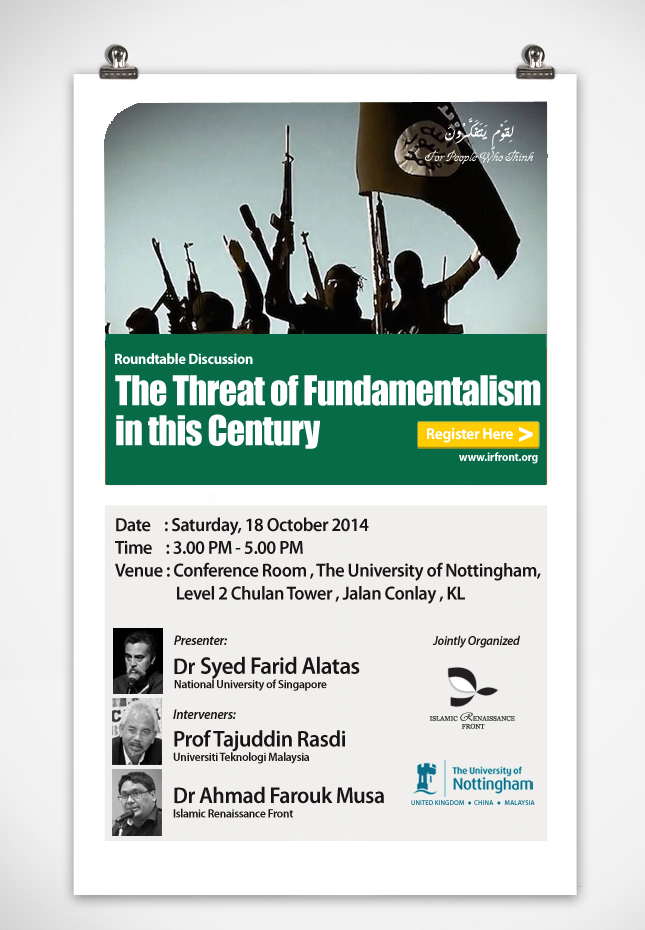
Date: Saturday, 18 October 2014
Time: 3PM – 5PM
Venue: Conference Room, The University of Nottingham, Level 2 Chulan Tower, Jalan Conlay, KL
Registration: https://www.eventbrite.com/e/roundtable-discussion-on-the-threat-of-fundamentalism-in-this-century-tickets-13657946285
How can one rationally explain the rise of Islamic fundamentalism today? Why in the age of reason, rationality and secularism have large numbers of people in the Muslim world gravitated and embraced a religious fundamentalist conception of the world?
From radical fundamentalist groups such as ISIL and the Taliban to more mainstream organisations such as the Muslim Brotherhood, the Muslim world seems to be dominated by fundamentalist Muslims. Where can we search for answers? History and sociology perhaps, rather than ideology, provide a lens to grapple with this growing social phenomenon.
Throughout human history during times of great social transformation and political turmoil, a natural concomitant has been the revival of religion. This is an observable sociological and historical phenomenon that transcends borders, ethnicities and civilisations.
Prof James Piscatori has perceptively noted that “religion, precisely because in the past it answered questions about life and death and provided its followers with moral links to each other, becomes the means by which individuals hope to answer the new question of what it is to be modern, and, in so doing, to gain perhaps a reassuring, common world-view. In this respect, born-again Christians and veiled-again Muslims are responding to the same broad phenomenon.” The upheavals associated with modernity, as Piscatori suggests, are central to understanding the rise of religious fundamentalism.
Modernisation, it should be emphasised, is a traumatic process. And it is important to appreciate that the modernisation process in the Muslim world has been very different from the West in many respects. Unlike in Europe where it was largely an indigenous process, in the case of Muslim societies, modernisation began as a direct result of the colonial encounter with Europe. Instead of innovation, the Muslim experience was one of imitation in an attempt to play catch up with the West.
It is tempting then to seek easy answers to complex social phenomenon. In the context of the debate on Islamic fundamentalism, an explanation has often been sought by focusing on the doctrinal character of Islam and its alleged anti-modern ethos. While it is tempting to do so, especially in post-September 11th world, focusing exclusively on ideology at the expense of sociology and history limits our understanding and clouds our judgment of this important and emotionally charged topic.
With this is mind, we seek to explore the root of religious fundamentalism especially Islam, its challenges in the modern world and our response to show how Islam can best come to term with the challenges of modernity.
Program:
1500-1505: Speech by Chairperson, Hazman Baharom
1505-1515: Welcoming speech by Prof Zaharom Nain
1515-1600: Presentation on “The Threat of Fundamentalism in this Century” by Prof Syed Farid Alatas
1600-1610: Intervener I: Prof Tajuddin Rasdi
1610-1620: Intervener II: Dr Ahmad Farouk Musa
1620-1700: Discussion
1700: Tea

